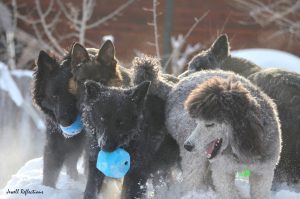
By Fran Jewell

When I was a kid, it was extremely rare to see homes with more than one dog. In fact, we were the only people in the neighborhood to have a dog! Now, it is commonplace to have at least two dogs, if not more.
I have been living with multiple dogs for 25 years. We learn a lot about dog behavior if we keep our eyes open and look through a dog’s eyes instead of our human eyes.
One of the biggest problems I see with having more than one dog is the human belief that all of our dogs should be treated equal. Quite often, I go to work with a new puppy where an older dog is enjoying retirement. The older dog is happy to just hang out, sleep on the sofa, or wake up for a walk or treats. The new puppy comes along and the owner feels compelled to allow the puppy the same privileges that the older dog has earned. The puppy is allowed on the sofa, to take a walk without a leash along with the older dog, or eat next to the older dog even if the puppy finishes first then pushes the older dog out. And the puppy is already sleeping in bed with the owners. When I ask the owners why, the response is usually, “How can I make Phoebe stay on the floor if Romeo is sleeping on the sofa or in our bed?”
The answer is sometimes hard for humans to swallow. In the dog world, life is not fair. Dogs have a natural hierarchy that most of us don’t really understand. In the human world, we are all equals, or at least we strive to be. In the dog world, older dogs should have the respect of the puppy or younger dog. Teaching a puppy to respect an older dog is just as important as it is to teach a puppy to respect people—not bite, not jump on us, not to growl, and so on. The way we treat puppies should make it clear to them that the older dog should be respected.
How? We feed the older dog first. The older dog can have privileges they earned long ago, such as sleeping in our bed or on the sofa. Go for walks without the puppy. Leave the puppy home when you go to the store, but take the older dog. Feed the older dog first and don’t let the puppy bother the older dog. Give the older dog special time and attention. And for the safety and wellbeing of the puppy, keep the puppy in a crate at night much like you would leave a child in a crib.
It’s also important for the puppy’s development to have time alone with you, too. Teach the dog to have a relationship with you alone so the puppy doesn’t learn to depend upon the older dog. If the puppy is always with the older dog, or always with you, you could be setting the puppy up for separation anxiety. If you have had a friend that has had a dog with severe separation anxiety, or experienced it yourself, it can be overwhelming to deal with and cost a fortune in destroyed items in your home.
Remember moderation in all things. The new puppy should spend time alone with you, time with the other dog, and time by herself. In the dog world, all things are not equal. Treat your older dog with special privileges the puppy doesn’t get.


